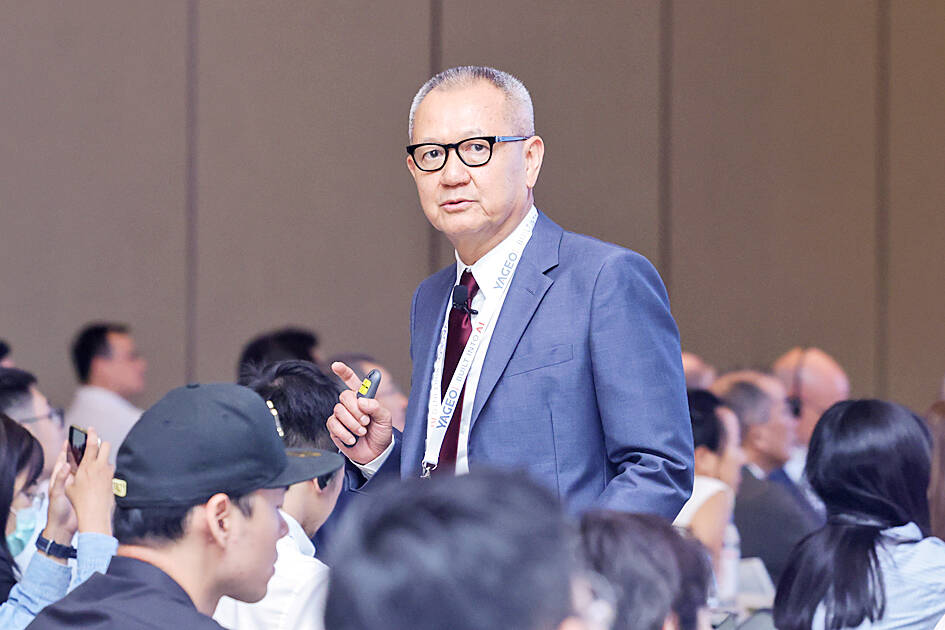Yageo Corp (國巨), one of the world’s top three passive component suppliers, said its products have been widely used in artificial intelligence (AI) applications, including servers powered by Nvidia Corp’s AI chips, which has helped to boost its AI-related business’ revenue contribution to about 5 percent.
This growing revenue from AI has been one of Yageo’s major achievements of the past six years, as the company transforms itself into a premium passive component supplier and shakes off cut-throat price competition from Chinese rivals in the standard components segment, Yageo chairman Pierre Chen (陳泰銘) told reporters on the sidelines of an AI summit arranged by the company in Taipei on Thursday.
Yageo has also dramatically reduced China’s revenue contribution to about 24 percent last year, versus as high as 78 percent in 2017, Chen said.

Photo: CNA
As part of its efforts to expand its product spectrum, Yageo dived into the AI sector about five years ago, concentrating on developing components and technologies to enhance power efficiency for AI applications, Chen said.
In Taiwan, Yageo has risen to become the largest supplier of X6S multilayer ceramic capacitors (MLCC), a high-capacity MLCC that is used in AI servers, Chen said.
“We have been deeply involved in the AI [sector]… Yageo will not be absent from any areas linked to AI applications,” he said.
“A majority of the market’s main AI players are our customers from Taiwanese assemblers to overseas AI companies,” he added.
As a long-term supplier to Nvidia, Yageo has also expanded its ability to supply high-capacity MLCCs for Nvidia’s latest and most powerful GB200 superchip through companies on Nvidia’s approved vendor list, the company said.
Global hyperscalers such as Amazon.com Inc and tech giants such as Meta Platforms Inc and Microsoft Corp are keen on investing in servers and data centers to help customers doing AI training and referencing over the next few years.
Chen said that he expected Yageo to benefit from this AI boom.
Yageo develops passive components to enhance power management and power efficiency for customers’ AI products to address the power consumption issue, it said.
Last year, Yageo was the world’s biggest producer of polymer tantalum, which is mainly used in AI servers.
Aside from servers, Yageo’s components also can be found in a wide range of chips that are used in laptops, accelerator cards, switches and autonomous vehicles.
“Yageo now is not the company as it was known 10 years ago,” Chen said.
The MLCC business only accounts about 17 percent of the company’s total revenue, as it has broadened its product portfolios through a series of mergers and acquisitions, Chen said.
In 2017, it accounted for half of the company’s overall revenue.
Magnetic components were Yageo’s biggest revenue source at 30 percent during the first half of this year, company data showed.
As supply chain management becomes an increasingly complicated challenge, Yageo has been tasked to provide a total solution to customers, Chen said.
Passive components only make up a mere 5 percent of customers’ component costs, he added.

TAKING STOCK: A Taiwanese cookware firm in Vietnam urged customers to assess inventory or place orders early so shipments can reach the US while tariffs are paused Taiwanese businesses in Vietnam are exploring alternatives after the White House imposed a 46 percent import duty on Vietnamese goods, following US President Donald Trump’s announcement of “reciprocal” tariffs on the US’ trading partners. Lo Shih-liang (羅世良), chairman of Brico Industry Co (裕茂工業), a Taiwanese company that manufactures cast iron cookware and stove components in Vietnam, said that more than 40 percent of his business was tied to the US market, describing the constant US policy shifts as an emotional roller coaster. “I work during the day and stay up all night watching the news. I’ve been following US news until 3am

UNCERTAINTY: Innolux activated a stringent supply chain management mechanism, as it did during the COVID-19 pandemic, to ensure optimal inventory levels for customers Flat-panel display makers AUO Corp (友達) and Innolux Corp (群創) yesterday said that about 12 to 20 percent of their display business is at risk of potential US tariffs and that they would relocate production or shipment destinations to mitigate the levies’ effects. US tariffs would have a direct impact of US$200 million on AUO’s revenue, company chairman Paul Peng (彭雙浪) told reporters on the sidelines of the Touch Taiwan trade show in Taipei yesterday. That would make up about 12 percent of the company’s overall revenue. To cope with the tariff uncertainty, AUO plans to allocate its production to manufacturing facilities in

Six years ago, LVMH’s billionaire CEO Bernard Arnault and US President Donald Trump cut the blue ribbon on a factory in rural Texas that would make designer handbags for Louis Vuitton, one of the world’s best-known luxury brands. However, since the high-profile opening, the factory has faced a host of problems limiting production, 11 former Louis Vuitton employees said. The site has consistently ranked among the worst-performing for Louis Vuitton globally, “significantly” underperforming other facilities, said three former Louis Vuitton workers and a senior industry source, who cited internal rankings shared with staff. The plant’s problems — which have not

COLLABORATION: Given Taiwan’s key position in global supply chains, the US firm is discussing strategies with local partners and clients to deal with global uncertainties Advanced Micro Devices Inc (AMD) yesterday said it is meeting with local ecosystem partners, including Taiwan Semiconductor Manufacturing Co (TSMC, 台積電), to discuss strategies, including long-term manufacturing, to navigate uncertainties such as US tariffs, as Taiwan occupies an important position in global supply chains. AMD chief executive officer Lisa Su (蘇姿丰) told reporters that Taiwan is an important part of the chip designer’s ecosystem and she is discussing with partners and customers in Taiwan to forge strong collaborations on different areas during this critical period. AMD has just become the first artificial-intelligence (AI) server chip customer of TSMC to utilize its advanced